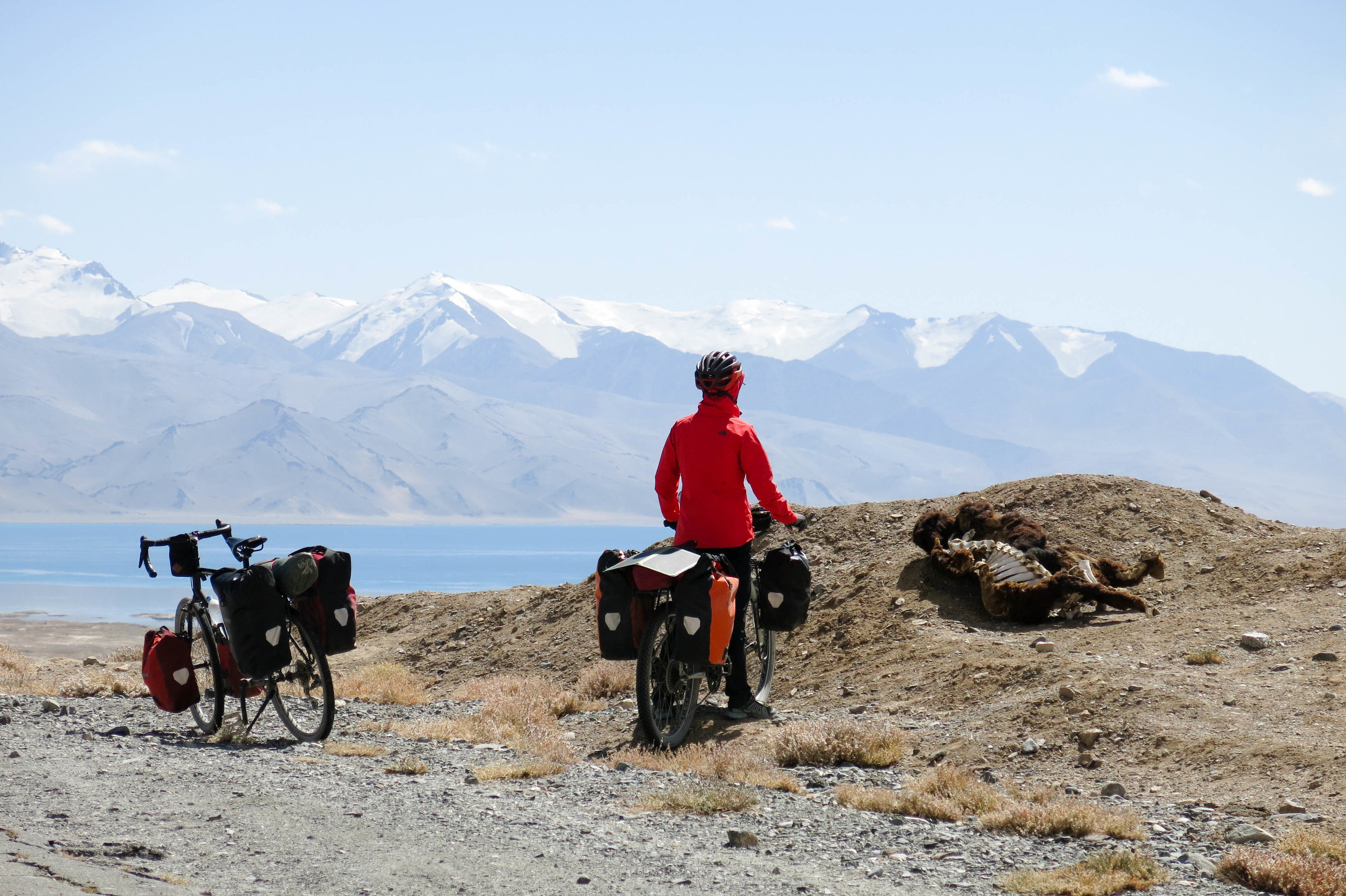A view of Lake Karakul and a yak carcass. PHOTO: JACK EWING
It was a couple of minutes after lunch, when we were back on the road struggling into the headwind, that I felt a trickle of panic.
We’d been riding for several hours after leaving Lake Karakul; the gradients of each climb getting progressively steeper and the wind’s chill growing harsher.
Too cold to remove the helmet. PHOTO: JACK EWING
For lunch we scrambled into a culvert, the only shelter from the gale, and sat on the edge of a stream eating stale bread with the last of our Pic’s peanut butter.
We shared a sweet apple I’d bought back in Murghab; a fresh, precious rarity in the land of grocery stores stocked only with biscuits and tins.
It was too cold to bother with getting the stove out.
Steeper than it looks. PHOTO: JACK EWING
Around the corner from our lunch spot I stopped to pull on my over trousers and merino gloves, and to adjust my buff so there were no gaps between it, my helmet and my jacket hood for the biting cold to enter.
The panic crept up in a voice that whispered, “you’re already quite cold, what happens if you get more cold? There’s nowhere to go but forward, and it’s very slow-going in this headwind.”
The voice continued to commentate the landscape around us – a vast plateau, desolate and speckled with some big rocks but nothing that would provide adequate shelter from the wind.
Mean-looking mountains with an icy sheen dominated the skyline.
The voice reminded me of the cautionary words from a motorbike rider we’d met earlier, that there were snow flurries in the forecast.
“We can’t be on this plateau if it snows, it’s too windy to pitch the tents, and if a gust snatches your glove or fleece as you struggle into it there’s no way you’re getting it back,” the voice carried on.
Such realisations of your own vulnerability are part of the excitement of bicycle touring in remote places.
It’s the thrill of complete self-reliance; the knowledge that the gear you’re carrying and your wits are your only defence against the wilderness.
It can be a little overwhelming when you’re cold though.
I silenced the voice and focused on each downward pedal.
By now the wind was brutally strong, keeping us at a pace of 4-5km/h on the gravelly road.
To make matters exponentially worse I’d picked up a new bug after I’d finally killed off the parasite, and it made its presence felt several times on that exposed alpine plateau.
Jack waited, hunched against the wind as I stopped, each time returning to my bike feeling weaker and more demoralised.
Compounding the mental strain was the fact we could see the last climb off the plateau for hours before we actually reached it, a constant reminder that after the marathon was a final, gruelling sprint.
Digging deep into my reserves of willpower I ground my way up the 5km of switchbacks to the border with Kyrgyzstan.
Entering the checkpoint hut we were met with a familiar face – the guy who’d stumbled drunk into our room at a guesthouse a couple of days before was the border guard stamping documents. “You were at our guesthouse,” I told him cheerily, although his sheepish expression would indicate he didn’t need reminding.
An Austrian couple we’d met in Khorog were there, and they’d been allowed to stay in the guards’ quarters that night on account of Sabrina’s nasty cold.
We asked if we could pitch our tent behind one of the buildings to avoid climbing the last stretch to the pass in the falling darkness.
But the guards’ empathy for cyclists had its limits and we were told, “it’s only 2km to the top”.
Exasperated but too tired to explain that 2km and 80m elevation would take us half an hour in the headwind, we set off again.
Kyzylart Pass, 4280m. PHOTO: ISOBEL EWING
The stone statue of a haughty-looking Ibex marking the summit was a glorious sight.
Triumph. PHOTO: JACK EWING
We rode down from the pass freezing but triumphant, our tires grinding over Kyrgyzstan’s distinctive red earth.
PHOTO: ISOBEL EWING
A ramshackle structure at the base of the valley greeted us with the word “Homestay” scrawled across it in paint.
We wondered at how a couple barely beyond their teens ended up living in this cold valley in the no man’s land between Kyrgyzstan and Tajikistan. PHOTO: ISOBEL EWING
In one small room with a stove lived a couple who can’t have been older than 22 and their two children, while a larger room was piled with bedding for guests.
We shared the space with two Polish cyclists and a Russian couple whose car had broken down, eating noodle soup prepared by the young mother.
To our delight, one of the Poles produced a block of Dutch dark chocolate.
Resting my head on a pillow that smelled faintly of hay and cooking, cosy from the heat of the stove, the despair on that stark plateau already felt distant.
The next day’s downhill awaits. PHOTO: ISOBEL EWING








